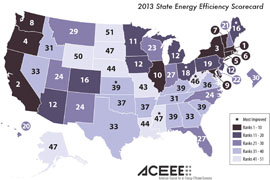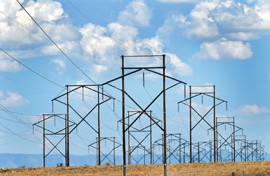Cronkite News has moved to a new home at cronkitenews.azpbs.org. Use this site to search archives from 2011 to May 2015. You can search the new site for current stories.
Arizona finishes 12th in national ranking on energy-efficiency policies
WASHINGTON – Arizona is the 12th-most energy-efficient state in the nation this year, the same position the state held last year, according to rankings released Wednesday by the American Council for an Energy-Efficient Economy.
The state’s utility policies were its greatest strength, scoring twice as high as the national median score. Much of that advantage came from Arizona’s Energy Efficiency Resource Standard, set in 2010 by the state Corporation Commission, said Annie Downs, an ACEEE research analyst.
“The Energy Efficiency Resource Standard is one of the most comprehensive policy efforts that a state can put forward,” she said in a conference call to announce the rankings Wednesday.
Arizona’s Energy Efficiency Resource Standard requires utilities with annual revenue over $5 million to institute energy-saving programs that reduce consumption from year to year. The program started in 2011, with a requirement that utilities show they saved 1.25 percent of the previous year’s sales, using their choice of energy-saving programs.
By the end of 2013, utilities must have saved at least 5 percent of their 2012 energy sold and by 2020 the program will top out at 22 percent savings in energy consumption from the previous year’s levels.
Arizona scored 24.5 out of 50 possible points on its total scorecard, one point less than it got in 2012. Downs said the ranking’s standards are raised each year, so states have to notably improve in order to maintain their score.
Although Arizona’s place in the rankings was unchanged compared to 2012, the state has improved dramatically in the last several years, rising from 29th in 2009.
That improvement is “a big deal,” said Jeff Schlegel, Arizona director for the Southwest Energy Efficiency Project, who said the state’s utility policies set it apart. Arizona was close to average in all other areas of the ACEEE scorecard, but its high score on utilities validates the state’s efforts, Schlegel said.
“Arizona is clearly ranked as a leader in terms of utilities,” he said.
Nationally, Massachusetts was ranked first for the third year in a row, having passed second-place California in 2011. Mississippi improved its score the most, by 5.5 points, and rose to 47th from last place in 2012.
Arizona ranked slightly above the median score for transportation efficiency, heat and power and appliance standards. It received the median score for state government-led efficiency initiatives, and was slightly below the median score for building-code compliance.
Energy Department Secretary Ernest Moniz said in the conference call that the programs scored in the report help meet the federal government’s climate change goals, in addition to saving money and creating clean-technology jobs.
“We think this is essential for building our low-carbon economy, and states have been out front … in dealing with climate change,” Moniz said.
In most-improved Mississippi, the greatest advantage of energy-efficiency programs is the savings in people’s utility bills, said Mississippi Public Service Commissioner Brandon Presley on the conference call. Because the state has a low median income, it is particularly important for Mississippians to save money on their bills, he said.
That sentiment holds true for Arizona, too, Schlegel said. The national recognition and environmental benefits are nice, but the economic benefits of the state’s energy efficiency are the most important lesson, he said.
“It’s great to have Arizona ranked high in national ranking, but what really matters is the energy savings,” Schlegel said.








